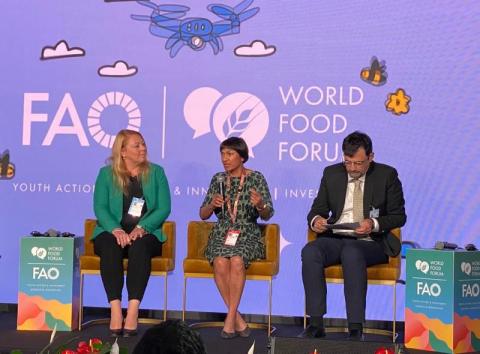The Special Representative for Australian Agriculture, Ms Su McCluskey, travelled to the United Kingdom (UK), Italy and France in October 2024 to promote Australian agricultural sustainability credentials and gain insight into global natural capital policy.
Engaging with trading partners and international regulatory bodies is important for Ms McCluskey to counter prescriptive policy approaches not suitable to Australia, and to understand what our markets expect. The visit continued strong engagement by the department to ensure Australia's trade interests are maintained.
McCluskey was supported by Ms Emma Hatcher, Deputy Permanent Representative to the United Nations Food and Agriculture Organization (FAO) and Mr Peter Creaser, Agriculture Minister Counsellor Brussels.
"This is my fourth visit to Europe in 2 years, which underscores the importance of continued engagement to advocate for Australian sustainability credentials", Ms McCluskey said.
"When discussing sustainability, we must also consider natural capital and the interplay with agriculture."
"Australia is well placed to lead this work and demonstrate to our trading partners that we can achieve sustainable practices while producing food".
London: Exploring the connection between natural capital and agriculture
Building on Ms McCluskey's participation at the Global Nature Positive Summit in Sydney the week prior, Ms McCluskey headed to London to meet with key industry organisations. There she discussed natural capital, biodiversity and sustainable agriculture, and ways to assist farmers to understand their emissions and supply chain requirements and protect their data. The UK's Global Farm Metric and the work of Red Tractor and Textile Exchange are examples of programs to enhance consumer confidence in food chains and provide farmers with frameworks to measure and monitor their sustainability systems.
"The importance of a whole systems approach in policy considerations at the intersection of agriculture and environment was emphasised," Ms McCluskey said.
"Australian agriculture is well placed to demonstrate great sustainability and lead the way."
Ms McCluskey also met with the UK Department for Environment, Food and Rural Affairs (DEFRA) to better understand how a country could transition away from environmentally harmful support (EHS) to more industry-wide productivity measures.
She noted that UK policy is in line with Australia and the Organisation for Economic Co-operation and Development (OECD) on repurposing EHS for better environmental outcomes.
Rome: Agri-food insights
For the second year, Ms McCluskey participated in the FAO World Food Forum, where she delivered a short intervention during the launch of the FAO report on "Anticipating agrifood system transformation: harnessing technologies and innovations for shaping a sustainable and inclusive future today". Ms McCluskey detailed the need to develop and implement emerging technologies and agri-innovations in a shorter timeframe than currently occurs to meet the challenges ahead.
While in Rome, Ms McCluskey also met with senior members of the FAO secretariat and the Secretary-General of the World Farmers Organisation (WFO), who emphasised the farmers' need to be included in sustainability conversations and in providing input into the development of policies.
"There is this consensus on agriculture being integrated into climate, energy and biodiversity plans (and vice versa)," said Ms McCluskey.
"It is pleasing to see the FAO is promoting the use of repurposed EHS for agri-food system transformations," she commented.

Paris: Working together towards sustainability
To finish the visit, Ms McCluskey met with officials at the OECD in Paris who were particularly interested in the Australian Agriculture Sustainability Framework (AASF), including how it encompasses a broad overarching view and complements individual industry frameworks.
"The AASF demonstrates the importance of collective actions, as government and industry can't work in isolation when developing frameworks, metrics and reporting models," Ms McCluskey said.
Ms McCluskey's visit to the UK and Europe strengthened connections with FAO, and uncovered opportunities for further collaboration with the UK, FAO and the OECD in sustainable agriculture policy discussions.
"It is encouraging to see Australia proactively demonstrating sustainability credentials through the AASF and the development of the Agriculture and Land Sectoral Plan," said Ms McCluskey.
"More work is now needed to better communicate these sustainability credentials to consumers and our trading partners, and to ensure agriculture is not negatively impacted by ideology and prescriptive policy," she concluded.






